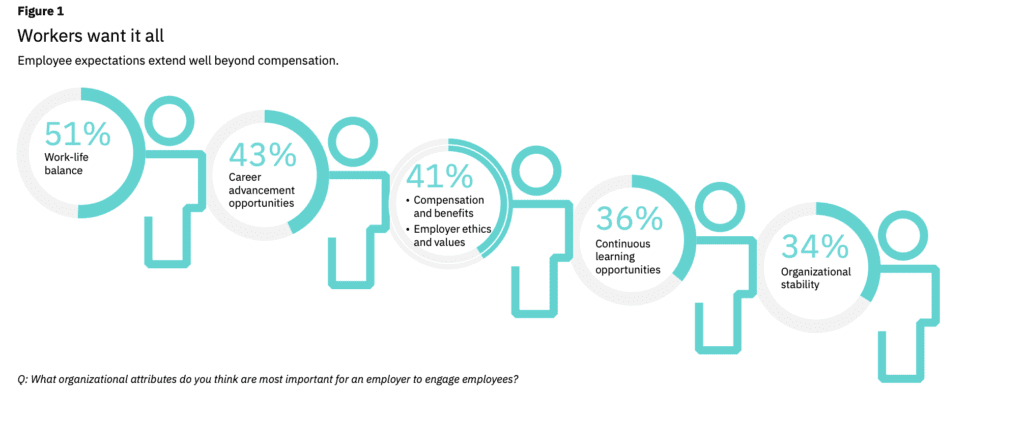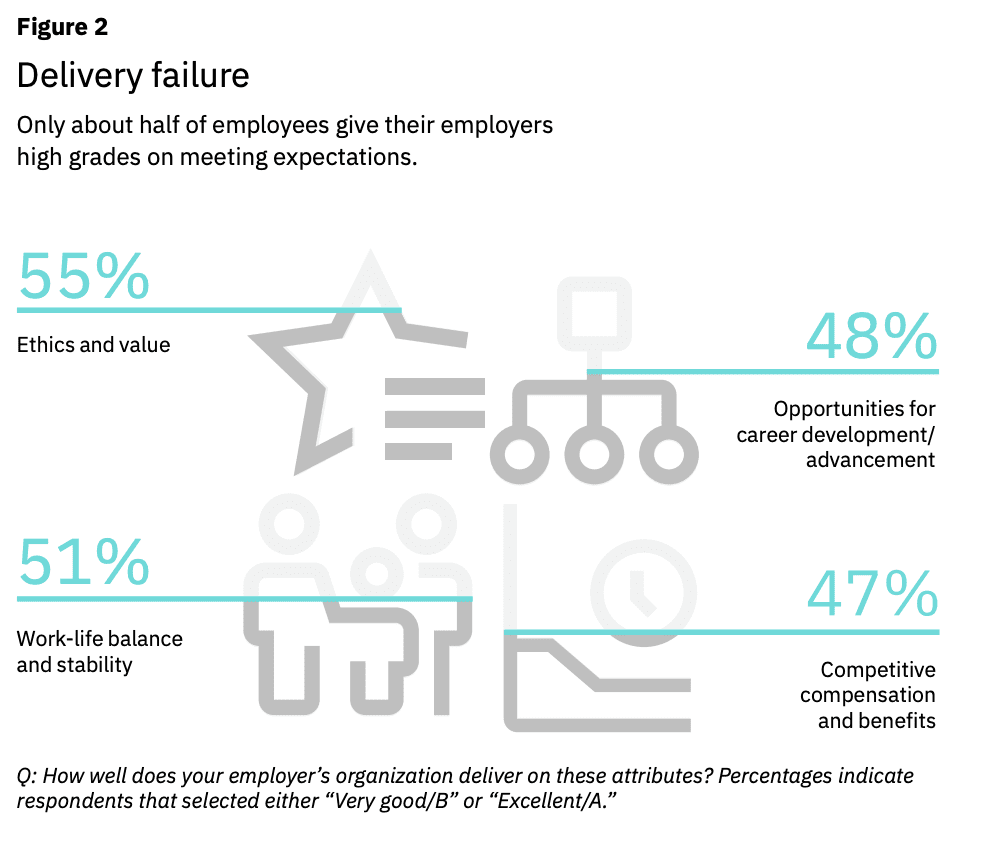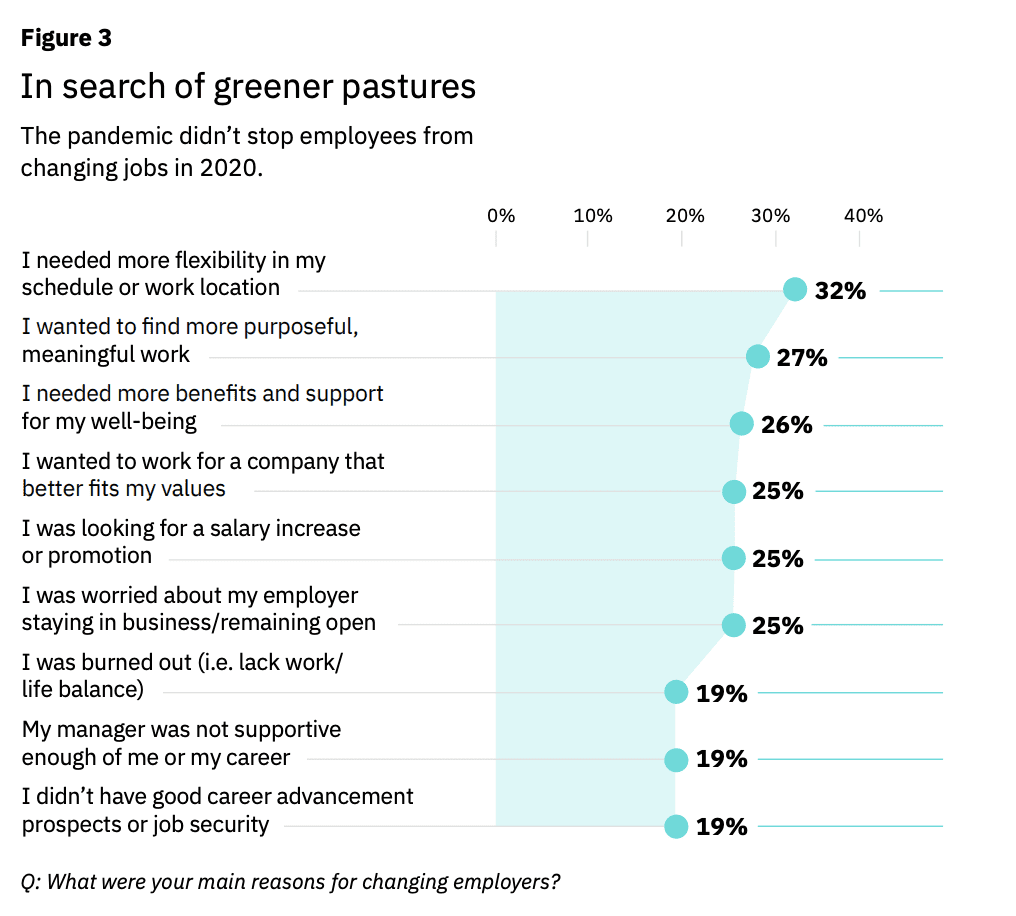Why your employees want to jump ship in 2021
Employers must leverage talent mobility and recruitment platforms to retain and engage current and prospective employees.
Why You Should Care
41% of employees said they prioritized compensation and benefits.
Employer ethics and values followed closely behind with 41%.
Only 29% of Gen Z indicated competitive salary and benefits were key to their engagement, compared to nearly half (49%) of those over 55.
Work-life balance (51%) and career advancement opportunities (43%) are the top priorities for employees in 2021.
That’s according to the IBM Institute for Business Value (IBV), which surveyed more than 14,000 consumers across nine countries in January.
Some 41% of respondents said they prioritized compensation and benefits. Employer ethics and values followed closely behind with 41% of employees saying they were important.
More than a third of workers said continuous learning opportunities (31%) and organizational stability (34%) were key engagement factors.
Overall, the survey found that employees were generally satisfied with how employers supported their well-being during the COVID-19 pandemic.

It’s not just about money
The survey’s results confirm that workers are looking for more than just compensation.
This was particularly true when it came to younger employees. For example, only 29% of Gen Z indicated competitive salary and benefits were key to their engagement, compared to nearly half (49%) of those over 55.
When asked how well their employers were living up to these expectations, workers appeared underwhelmed.
Only about half of workers gave their employers high marks on delivering what is most important to them across the board.
While 55% of employees scored their employers highly in ethics and values, fewer than half were happy with career development and advancement opportunities (48%), and compensation and benefits packages (47%).

The pressure to digitize and adapt to the new working world is likely taking a toll on employees.
According to the survey results, one in five employees changed jobs voluntarily in 2020. In fact, Gen Z (33%) and Millennials (25%) accounted for more than half of job-hopping employees — highlighting the urgent need for employers to find ways to retain young talent.
Interestingly, work location flexibility was the main reason why workers changed jobs (32%). Some 27% of employees said they moved on to pastures new in the hope of finding more purposeful and meaningful work.
One in four said they were looking for better benefits and wellbeing support, or a salary increase or promotion.

Job hopping is intensifying
Survey findings suggest that job hopping is intensifying in 2021.
According to the data, more than one in four employees are looking to change jobs in 2021 — and over 60% of these already made a move in January.
Unsurprisingly, Gen Z and Milennials make up the largest portion of this group.
Those getting ready to leave their current roles cited similar reasons as those who made a move in 2020.
However, it’s worth noting that salary increases and promotion opportunities jumped to the top of the list for 2021 — with over a third of respondents citing financial motivations as the top reasons to make a career move.
Approximately one in four still identify well-being support and more meaningful work as key motivators.
With this many employees looking for new opportunities in a tight labor market, executives should be wary of what will happen when hiring accelerates.
“According to our survey, 87% of employees claim they have the necessary skills to meet their job/employment goals in 202. While this self-assessment may turn out to be a bit over-confident, organizations should be concerned about how a mass exodus of valuable talent could impact their future performance,” the report says.
how to succeed
Employers must leverage talent mobility and recruitment platforms to retain and engage current and prospective employees.
Communication is also key. Organizations need to build a dialogue and offer transparency into the decision-making process to build better, and more meaningful relationships with workers.
Armed with the right data, HR teams should look to invest in initiatives and tools that will boost employee engagement and loyalty for the long-term.
Sign up to the UNLEASH Newsletter
Get the Editor’s picks of the week delivered straight to your inbox!

Columnist
Former editor of UNLEASH, Yessi is a seasoned tech journalist and regular contributor to Times Radio in the UK.
